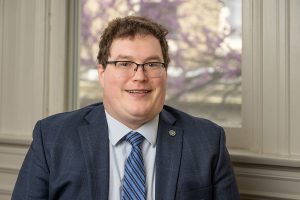Subscriber Benefit
As a subscriber you can listen to articles at work, in the car, or while you work out. Subscribe Now
Plews Shadley Racher & Braun LLP
Michigan State University College of Law, 2017
Why did you decide to enter the legal profession?
I wanted to help people. At first it was survivors of human trafficking (and I still have connections that let me do that occasionally), but in retrospect, I really just enjoy helping solve people’s problems.
What’s the best advice you’ve ever received?
One of the first things we were told as clerks on the 6th Circuit Court of Appeals was “never, ever make light of the lower court or the litigants.” Seems like easy advice to follow. But when all you do is write opinions for someone with life tenure in a system where Supreme Court review is exceedingly rare, there’s a temptation to try and be clever or poke fun at people making “silly” arguments. Those barbs can seem funny in chambers, but it wasn’t until practice that I realized how much damage they can do to the public’s perception of the judicial system.
What makes a good lawyer/judge?
Competency and respect. No one likes losing, but they like it less when they don’t feel like they got a fair shake or if it feels like the judge kicked them on the way down. Likewise, in law school and early practice, I was puzzled by footnotes like those that Indiana’s appellate judges frequently use: “We thank counsel/amici for their excellent briefing and oral argument in this case.” It seems unnecessary from a legal writing standpoint — until you lose a case you worked hard on and thought you should win. Those acknowledgements from the judges make it hurt less, and they help remind you that the judges are trying to work out the law correctly, not just pick the best advocate.
What lessons did you learn from your 6th Circuit clerkship that carry over to your career in private practice?
A lot, but I think the biggest lesson was the importance of intellectual diversity. A lot of federal judges only hire from their bailiwick — i.e., you have to be a FedSoc or an ACS adherent to even be considered. I clerked for an extremely conservative judge, but he didn’t use any sort of ideological litmus test. He’d hire smart people from across the entire political spectrum because the friction and debate made the court’s work-product better. It also helped find common ground with the members of the court who rarely (if ever) agreed with him on fundamental issues.
Your nominator said you have an active amicus practice — why is that work important to you?
There are two main reasons. First, I feel like it’s part of a lawyer’s obligation to the courts, particularly for lawyers like me who specialize in a particular subject matter (insurance law). It’s not always easy or possible for courts to probe the consequences of their decisions just by sitting and staring out the window (another lesson learned from the 6th Circuit). Even the smartest and most experienced judges have gaps in their knowledge bases. Identifying and filling those gaps can bring tremendous value to the process and literally turn the tide of litigation. Second, as a junior lawyer, it provides a valuable professional development opportunity. Amicus work is often unpaid, and the client frequently has nothing directly at stake in the case. As a result, partners and clients are often more willing to give junior lawyers more latitude in making strategic decisions and in signing the brief. It helps you stand on your own two feet and develop your own voice.
What is something you wish people knew about lawyers?
We’re not superhuman. Money is often both necessary and, at the same time, insufficient to solve a lot of problems. And not every case is winnable (or worth winning).
If you hadn’t pursued a legal career, what would you be doing?
I’m honestly not sure. I graduated high school wanting to be an architect, and that is what drew me to Ball State University for college. After one year I switched to Ball State’s legal studies (i.e., paralegal) program, which led me straight to law school. So, I might be helping to design all the houses/apartment buildings going up around Indianapolis.
Who is someone who has inspired you in your career?
It’s honestly hard to pick one person, but right now I think the person I find most inspiring is Elizabeth Prelogar, the current U.S. solicitor general. She’s had to face an extremely hostile court multiple times in the last two years on issues of dire importance. Every time, she’s been magnificent.
How do you spend your free time?
I have a 4-year-old daughter, so free time is scarce and often spent watching “Bluey,” going to the park or playing a wide variety of made up games. When I do get time to myself, I enjoy building/collecting Star Wars legos, Nintendo-console video games and being out in nature.
Do you have a secret talent?
My great-aunt, who passed away a few years ago, taught me how to do cross-stitch embroidery when I was 8 or 9. It is not a skill typical for millennial boys, but it is something I enjoy doing even today.•
Please enable JavaScript to view this content.
